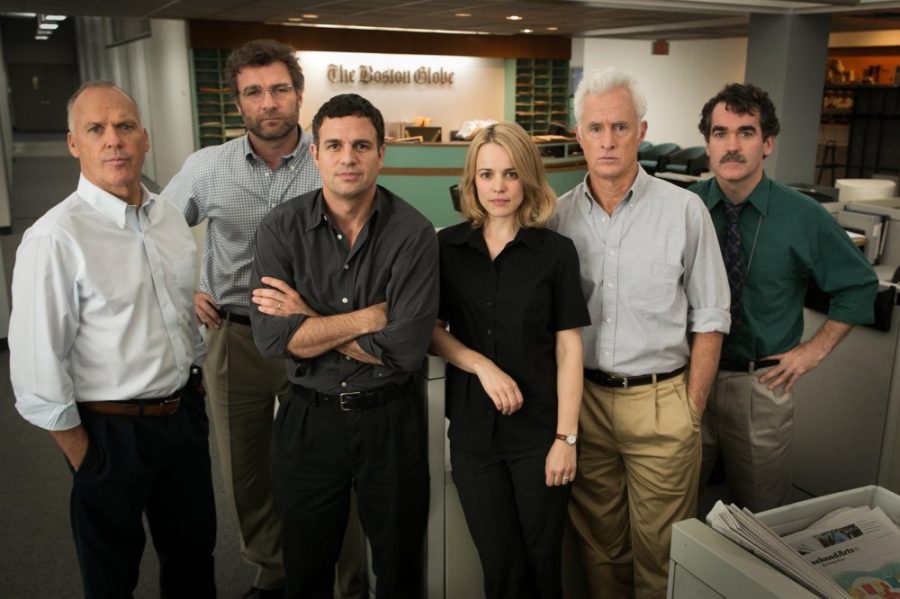The revelation that priests of the Catholic Church had been sexually abusing children systematically came to light in the early 2000s, shaking the world and one of its oldest institutions to their cores. What was the story behind the story, though?
As it turns out, there’s really nothing fancy to the backstory of one of the most influential pieces of investigative journalism in recent memory. Backed by strong performances from its entire cast, “Spotlight” turns the basic tenets of journalism, hunting down sources and asking the right questions, into compelling, heartbreaking drama. It will leave you filled with the moral outrage that something should have been done about this fiendish epidemic so much sooner, but you will also leave with the resolution that, in the end, something was finally done.
The Boston Globe around the turn of the 21st century is facing some changes, but, then again, when was the last time print journalism wasn’t facing major changes? The newspaper is bringing in a new editor, Marty Baron (Liev Schreiber). The first strike against him is that he’s bounced around from The New York Times to The Miami Herald and now to the Globe; the second strike, and certainly the most severe, is that he’s a Jew in this insular Catholic community
Schreiber’s Baron, who speaks with the quietly stilted manner of a man who chooses his words very carefully, wants the paper’s long-term investigative unit, Spotlight, to look into sporadic allegations that Catholic priests in the area have been molesting children.
In Boston, you would be most likely to see the headline “Catholic Priests Sexually Abuse Children” in The National Enquirer, right alongside a feature about a half-man, half-wolf baby. This is about the amount of seriousness that Spotlight’s head, Robbie Robinson (Michael Keaton), meets the task with.
He takes it back to his Spotlight team, which is located in cramped offices that almost seemed to have been forgotten by the rest of the newspaper. Spotlight consists of only four people: Robbie, Michael Rezendes (Mark Ruffalo), Sacha Pfeiffer (Rachel McAdams) and Matt Carroll (Brian d’Arcy James). They’re diligent reporters, and they get to work retreading leads that the newspaper has looked into before.
The reporters for Spotlight seem to be a cut above the rest, simply for the fact that they carry their task out to the very end. Previously, all other reporters had dismissed any claims against the Church as the protestations of the overly zealous and the deranged.
However, as Spotlight keeps digging and ignoring those around them, who tell them that there isn’t a story, they keep finding out more.
And, boy, is it ever hard to ignore their surroundings. The hallmark of this movie is how it shows the consummate, insidious presence that the Catholic Church has in the city of Boston, like ivy that fuses itself to a trellis. There are small instances, like a cross around a neck, and larger examples, like a towering church building looming in the background. Whatever the size, they are everywhere.
“If it takes a village to raise a child, it takes a village to abuse one,” one character morbidly quips.
Two movies this fall have established the consequences of the insular atmosphere of Boston, where people turn a blind eye to the misdeeds of their friends. There was “Black Mass,” where Johnny Depp played South Boston gangster Whitey Bulger, and now there’s “Spotlight.” “Spotlight” is the better of the two in nearly every aspect.
Ruffalo, playing a quirky, lurching Rezendes; McAdams, playing Pfeiffer like she plays most every other character (that’s a good thing); and Keaton, as a smirking Robinson, who seems to always know more than he lets on, pursues leads, knocks down doors—never literally, but it feels like the overzealous Rezendes made to do so at one point—and liaison with lawyers who seem to be on opposite sides of the aisle (Billy Crudup and Stanley Tucci).
The tension and drama mount with the mystery. We know that they’re going to nail this case, but how are they going to do it? What’s the big break going to be?
As it turns out, yes, some things do break their way, but they wouldn’t have even been in a position to benefit from these breaks if they hadn’t done their due diligence. There’s nothing sexy about journalism; it’s phone call after phone call, pens, steno pads and combing through old, dusty documents.
The filmmaking of “Spotlight” is as sound as its subjects: solid through and through.
A-
Follow Alex Guyton on Twitter.









